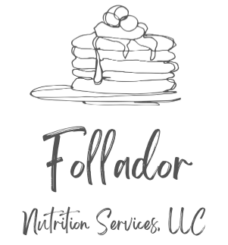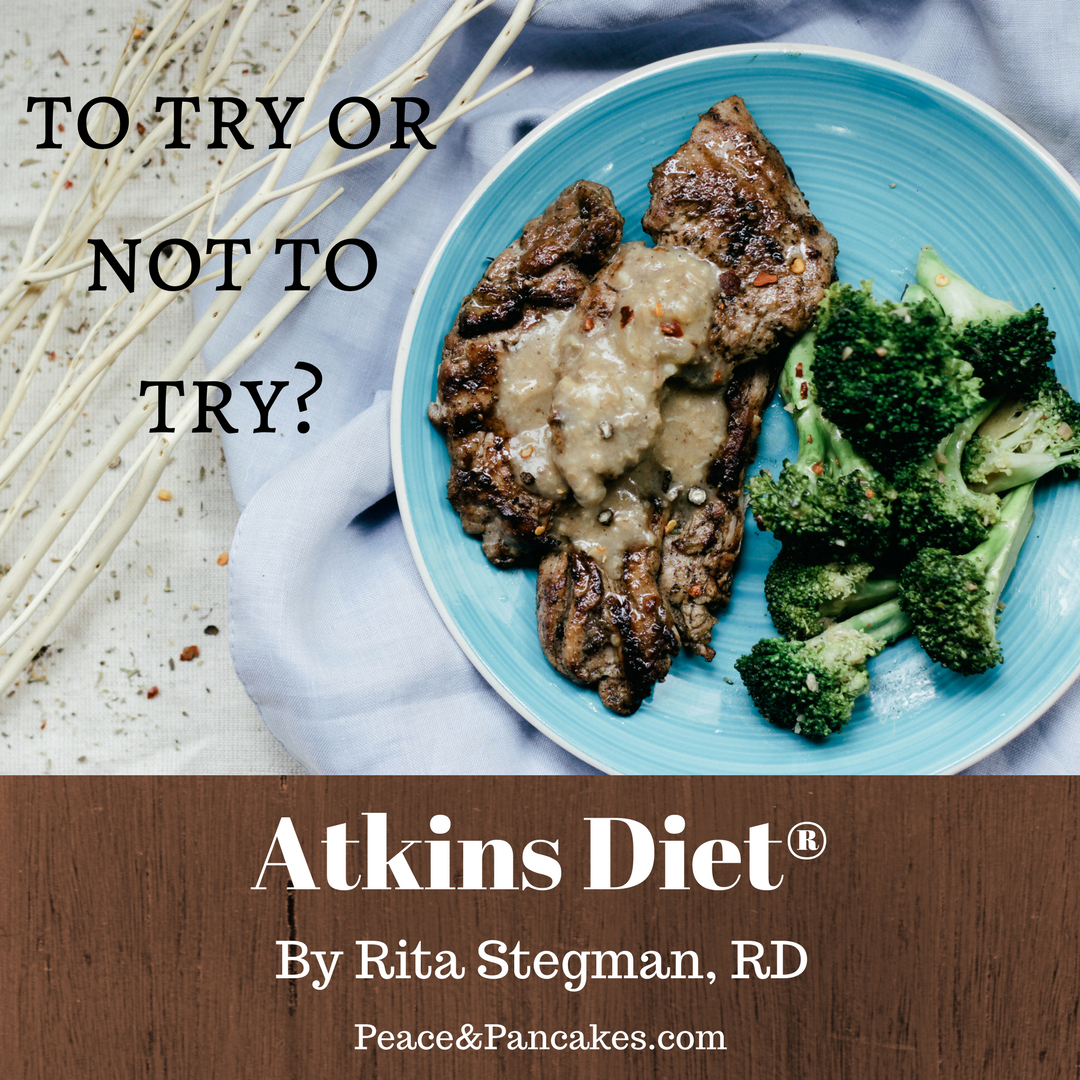This post is part of the “To Try or Not to Try” blog series. Written by a registered dietitian (RD) or dietetic intern, each post explores the claims and science surrounding a different dietary pattern or trend. After compiling this research, each RD or RD2be gave the diet a grade based on whether it appears to hold up to the hype. A = “yes, go for it!” and F = “no way, absolutely not!”
About the Author:
Rita Stegman, RDN is a clinical dietitian at Beth Israel Deaconess hospital in Milton, MA. She received her undergraduate degree in dietetics at University of Delaware and completed her internship at University of Massachusetts in Amherst.
What is the Atkins diet recommended for?
The Atkins diet® is a low carbohydrate weight-loss plan first made popular by the 1972 book Dr. Atkins’ Diet Revolution by the cardiologist Dr. Atkins. This diet is touted as a weight loss solution, with the primary principle being that a low carbohydrate diet promotes using fat as fuel. There is also a claim that the diet stabilizes blood sugars, therefore having implications for diabetes.
The Atkins diet® is a branded ketogenic diet. Ketogenic diets were addressed previously in this blog series and will not be detailed here; however, the Atkins website makes the claim that Atkins is a “better ketogenic diet” because the recommended intake of fat is 60-70% compared to 75-90% in a ketogenic diet (a slightly higher intake of protein and carbohydrates). In the medical community, ketogenic diets are often used as part of the treatment for neurological conditions.
What foods are allowed?
Currently, the website describes two different diet plans with phases that outline the permissible food groups and amount of carbohydrates. Atkins 20 ™, the original Atkins, has 4 phases, with the limited foods in each phase being high carbohydrate foods. At each phase, more groups are included.
- Phase 1: only 2 areas of “acceptable foods,” which are foundation vegetables, proteins, healthy fats, most cheeses, nuts, and seeds.
- Phase 2: Berries, cherries, and melons are allowed.
- Phase 3: Starchy vegetables, whole grains, and fruits are added.
- Phase 4: Whole grains are added, but intake is limited. For reference, 1 cup of cooked brown rice is 45 net carbs, approximately half of the carbs allowed daily in this phase.
What is the overall nutrient composition?
Carbohydrates are limited and increase during each phase of Atkins 20 ™:
- Phase 1: 20-25g
- Phase 2: 25-50g
- Phase 3: 50-80 g
- Phase 4: 80-100g
To put this amount of carbohydrates into perspective, for a 2000 calorie diet, phase 1 has about 4.5% of calories from carbohydrates and phase 4 is 18% of calories from carbohydrates. This is much lower than the Institute of Medicine’s guideline, which recommends that 45-65% of calories come from carbohydrate foods.
There are no specific guidelines for protein and fat; however, a graphic on the website suggests that 20-30% of calories should be from protein, with the remainder coming from fat.
Are the claims about the Atkins diet supported by science?
The Atkins website provides scientific studies touting the benefits and downplaying the risks of following this diet. When looking at any research, it is important to evaluate bias or the benefit that the researcher has when making their claim. While the arguments on the website and in the books might seem compelling and perhaps flawless, the publishers stand to make a lot of money by promoting these benefits.
The ketogenic diet has proven health benefits, although the research is still relatively new. The Atkins diet likely has similar benefits in terms of health outcomes, such as weight loss. In terms of weight loss, there is no denying that there are people who find success on this diet. Initially, the loss of glycogen stores in the liver has a diuretic effect, which is why you find so many people boasting rapid weight loss. Additionally, any sort of diet that requires you to track what you are eating can have a weight loss benefit. Some claim the reason Atkins may work better than a high-carb, low-fat diet is because fat increases satiety and keeps people full for longer.
Who should definitely not try the Atkins diet?
Anyone with existing cardiovascular disease/metabolic syndrome/elevated lipids should be limiting their intake of saturated fat. Additionally, since this diet is extremely low in carbohydrates, people with diabetes should take caution and consult their doctor or another licensed healthcare practitioner, especially if on blood glucose-lowering medications. Athletes should also consult with a dietitian before attempting this diet, as this population typically has higher carbohydrate needs.
Is the Atkins diet realistic and sustainable?
Most of the clinical studies done on the Atkins diet are short-term and researchers suggest that most people do not continue on the diet for over a year. A study on 32 subjects found that half of them stopped the diet before the 4-month mark. The researchers concluded that the experience for the average person is far less positive than portrayed in the media1.
The FAQ of the Atkins website suggests, “individuals can easily avoid almost all saturated fats while on Atkins by following the plan as a vegetarian.” I don’t believe most people would choose to do this; I believe the diet’s appeal is the “allowance” of high-fat meats. At any rate, the vegetarian plan advises eggs and cheese as protein sources, both of which are high in saturated fat (although, these are of course suitable in moderation). This contradicts the statement of avoiding “almost all saturated fat.” *
For vegetarians and omnivores, it is hard to find protein sources that are high in protein but low in saturated fat and carbohydrates. Even sources of healthy fats, such as nuts and olive oil, contain a percentage of saturated fats. Items do exist that are solely high in protein but these may be hard to come by and therefore expensive.
* Example, if you’re interested: Atkins 20 recommends 20-30% of calories coming from protein. 25% of a 2000 calorie diet is 125g of protein. Say half of this comes from eggs- that would be 10 eggs per day (at 6g of protein per egg) and 16g of saturated fat (at 1.6g per egg). Say the remaining protein comes from cheddar cheese (for simplicity). At 7g of protein per ounce, that would be almost 9 ounces of cheese (or approximately 1 cup). This would give you 54g of saturated fat. The total saturated fat from these vegetarian protein sources is 70g. The American Heart Association recommends 11-13g of saturated fat per day.
What are the overall pros and cons of the Atkins diet?
This does not appear realistic and sustainable for most people. Even if weight loss is achieved and people do not gain the weight back, there are many reasons that this is not healthy weight loss. Dietetic professionals do not recommend weight loss greater than 2 pounds per week. Additionally, one study noted that weight reduction wanes after 6 months in people following the diet2.
Multiple studies suggest an increased risk of cardiovascular-related deaths following this diet, which is logical given the known relation between saturated fat intake and CVD. According to one study, 1 in 3 individuals on a low carbohydrate diet experience a significant increase in total and LDL (“bad”) cholesterol3.
Grains are important sources of B vitamins, which are needed for the body to metabolize food for energy. They also play a role in producing healthy blood cells and synthesizing hormones and neurotransmitters; thus, a deficiency could result in anemia, depression, memory loss, and skin inflammation. Additionally, the diet encourages high fiber foods, but it may not be realistic for people to meet their fiber needs each day. As a result, good bacteria might not be getting enough prebiotics to feed on.
The Atkins website contains a multitude of products for purchase, therefore, the company has a lot to gain by promoting this diet as the one-and-only successful weight loss plan. I would advise any person to be wary of a diet with a brand. The makers of the products for purchase are motivated by sales, not the health of the consumer.
What grade do you give this the Atkins diet?
I would give this diet a D. I believe that many people can be successful at short-term weight loss, which is the primary goal. I do not believe the diet is realistic or sustainable for most people, however, as mentioned above.
What is your general recommendation for a healthy eating pattern for the average human?
My recommendation for all healthy people is moderation. I think the USDA’s MyPlate is a good indication of a balanced meal: high in vegetables with a moderate amount of whole grains and lean proteins. Many fad diets, such as Atkins, emphasize a lot of one thing and a little of another. I don’t think that sort of diet is realistic or appropriate for many people. Additionally, I don’t believe in deprivation. As long as there is balance in your life it is okay to eat the food that you may think of as “bad.”
I also am an advocate for plant-based foods. Whole grains, fruits, vegetables, and legumes are high in important vitamins and fiber. Fiber keeps you full, keeps your heart healthy and your intestines moving. I don’t think you can go wrong with plants as the foundation of your diet.
DISCLAIMER:
This content is intended for informational and educational purposes only. It is not intended as medical advice, medical nutrition therapy, or individualized nutrition counseling. Talk to your doctor or another licensed healthcare practitioner before making any changes to your diet, medications, or exercise routine. The opinions of these authors are their own and are not approved, sponsored, or endorsed by any professional organizations including but not limited to the Academy of Nutrition and Dietetics, United States Department of Agriculture, Food and Drug Administration, National Institutes of Health, American Heart Association, and American Diabetes Association.
Sources:
1. Experiences Individuals Have While on the Atkins Diet. 2008 JAND. Reasor, Clemens, Roach, Meeks
2. Effect of High Protein vs High Carbohydrate Intake on Insulin Sensitivity, Body Weight, Hemoglobin A1c and Blood Pressure in Patients with Type 2 Diabetes Mellitus. ©2005 Journal of American Dietetic Association. Sargrad, Homko, Mozzoli, Boden
3. Development of Symptomatic Cardiovascular Disease after Self-Reported Adherence to the Atkins Diet. ©2009 Journal of the American Dietetic Association Barnett, Barnard, Radak
4. High-protein, low-carbohydrate diets: Do they work? ©2009 JAND. Beyond the Headlines


You really make it appear really easy with your presentation however I to find this matter to be really something that I feel I might never understand. It kind of feels too complicated and very broad for me. I am taking a look ahead to your next post, I will try to get the cling of it!
You actually make it appear so easy together with your presentation but I find this matter to be actually something which I believe I might by no means understand. It seems too complex and very broad for me. I’m looking ahead on your subsequent publish, I will attempt to get the hold of it!
Let me know what info you don’t understand, and I can clarify! Thanks!
Excellent blog right here! Additionally your web site lots up fast! What host are you the usage of? Can I get your associate link for your host? I desire my web site loaded up as fast as yours lol